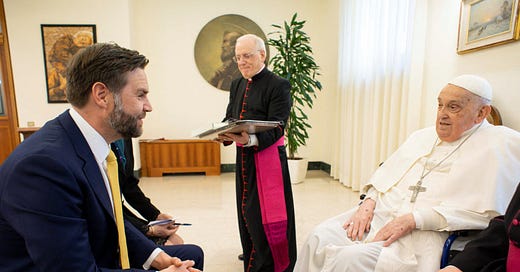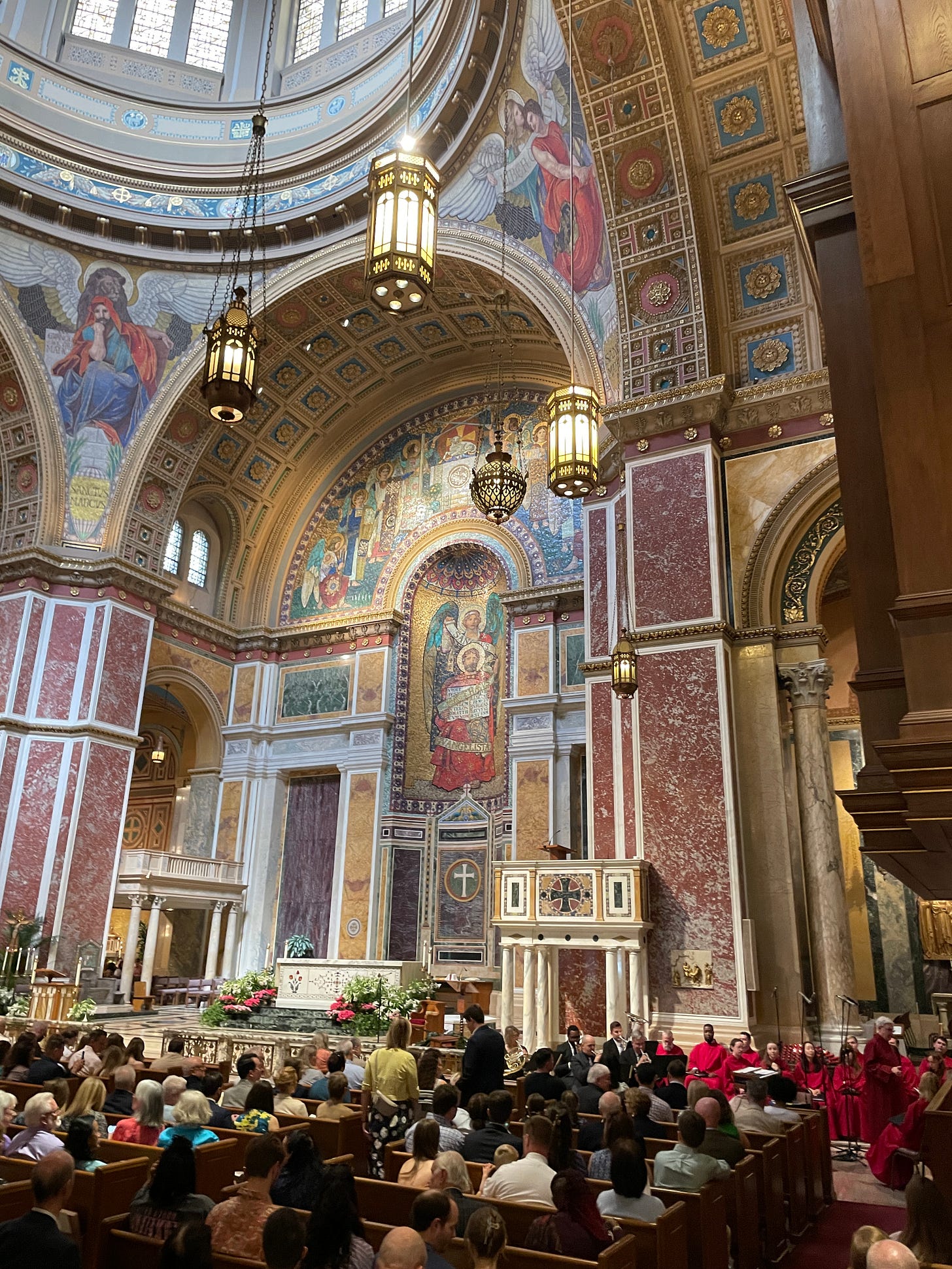Do You Love Thy Neighbor? Then Vote Like It.
On Easter Sunday, I returned to Mass and was reminded how far Catholic values are from the way many of its followers vote.
Today is April 20th, 2025. It’s Easter Sunday, and for the first time in a while, I went to Mass.
I was raised Catholic. I went to Sunday school, sang in the choir, served as an altar server, and was confirmed my freshman year of high school. But once COVID hit, I stopped going. I never fully believed in Jesus the way I was told I should. I’ve long struggled with the Church’s stances on abortion and LGBTQ+ rights, and I couldn’t reconcile its history of protecting sexual abusers.
Still, the rituals are grounding. I like the prayer and moments of mindfulness and reflection. I like that Mass is an hour where I’m not on my phone. I like singing. I like being around other people who are trying to be good, even if we don’t all agree on what that means.
So this morning, I went to the Cathedral of St. Matthew the Apostle for 11 a.m. Mass, led by Rev. Monsignor W. Ronald Jameson. The place was packed. I sat in overflow seating directly to the right of the altar, above the choir. I couldn’t see the priest, but I could hear him clearly. His homily was about loving thy neighbor, welcoming immigrants, feeding the hungry, and caring for those displaced by war.
And all I could think about was how many in that room—devout, generous, well-meaning people—likely voted for policies and a candidate whose platforms stand in direct opposition to everything being preached.
In November, Donald Trump won the Catholic vote by a wide margin. Exit polls show 59% of Catholics backed him, a 12-point increase from 2020. His campaign leaned into it—courting Catholics aggressively in the final weeks with attacks on Harris’s religious record and pro-choice stance. He falsely claimed that she advocated for “rip[ping] the baby out of the woman in the eighth, ninth month and even after birth,” a statement that is not only inflammatory, but also medically and legally incoherent, and he amplified JD Vance’s accusations of anti-Catholic bias against her.
The Church has immense reach. Every Sunday, millions hear homilies on compassion, dignity, and service. So how do we reconcile a faith rooted in mercy with political support for cruelty, exclusion, censorship, vengeance, and fear? What happens to 'love thy neighbor' when Catholics step into the voting booth?
This tension between Catholic moral teaching and American political rhetoric was displayed this week, when Vice President JD Vance made an unannounced visit to Pope Francis during Easter celebrations in Rome.
The brief meeting came after a pointed rebuke from the pope earlier this year. In February, Pope Francis issued an open letter to American bishops condemning the United States’ policy of mass deportations, calling it a violation of human dignity and a distortion of Christian moral priorities. He reminded the Church that Christ himself was a refugee, forced to flee with Mary and Joseph to escape violence, and that the migration crisis is a defining moral test of our time. While affirming a nation’s right to protect its people, the pope wrote that policies built on “the privilege of some and the sacrifice of others” ultimately “begin badly and will end badly.” He rejected the idea that undocumented status should be conflated with criminality and criticized any ideology that elevates national identity above the universal dignity of the human person. “The true ordo amoris,” Pope Francis wrote, is “love that builds a fraternity open to all, without exception.”
Following their brief and somewhat awkward Easter encounter—during which JD Vance told the pope, “I pray for you every day”—a papal aide addressed the crowd in St. Peter’s Square, reiterating Francis’s condemnation of anti-immigrant sentiment: “How much contempt is stirred up at times towards the vulnerable, the marginalized, and migrants!”
On the U.S. Conference of Catholic Bishops “Take Action” page, the four featured campaigns include defunding Planned Parenthood and opposing taxpayer-funded abortion overseas, but also protecting Dreamers and mixed-status families and preserving safety net programs like Medicaid and SNAP for vulnerable families.
Clearly, the Catholic Church is full of contradictions. That’s not new. But it’s also full of people who care deeply about doing the right thing—who believe in human dignity, charity, and community. We must confront the dissonance between our values and our politics.
Jesus was a refugee. He lived among the poor and stood with the outcast. He rejected violence, hypocrisy, and oppression. Pope Francis has reminded Catholics that if they are to live in Jesus’s image, they cannot make peace with leaders who weaponize faith for cruelty. You cannot preach love and vote for hate.
Happy Easter!






